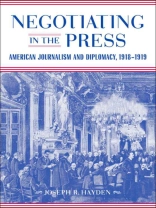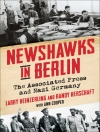Negotiating in the Press offers a new interpretation of an otherwise dark moment in American journalism. Rather than emphasize the familiar story of lost journalistic freedom during World War I, Joseph R. Hayden describes the press’s newfound power in the war’s aftermath — that seminal moment when journalists discovered their ability to help broker peace talks. He examines the role of the American press at the Paris Peace Conference of 1919, looking at journalists’ influence on the peace process and their relationship to heads of state and other delegation members. Challenging prevailing historical accounts that assume the press was peripheral to the quest for peace, Hayden demonstrates that journalists instead played an integral part in the talks, by serving as ‘public ambassadors.’
During the late 1910s, as World War I finally came to a close, American journalists and diplomats found themselves working in unlikely proximity, with correspondents occasionally performing diplomatic duties and diplomats sometimes courting publicity. The efforts of both groups to facilitate the peace talks at Versailles arose amidst the vision of a ‘new diplomacy, ‘ one characterized by openness, information sharing, and public accountability. Using evidence from memoirs, official records, and contemporary periodicals, Hayden reveals that participants in the Paris Peace Conference continually wrestled with ideas about the roles of the press and, through the press, the people.
American journalists reported on an abundance of information in Paris, and negotiators could not resist the useful leverage that publicity provided. Peacemaking via publicity, a now-obscure dimension of progressive statecraft, provided a powerful ideological ethos. It hinted at dynamically altered roles for journalists and diplomats, offered hope for a world desperate for optimism and order, and, finally, suggested that the fruits of America’s great age of reform might be shared with a Europe exhausted by war.
The peace conference of 1919, Hayden demonstrates, marked a decisive stage in the history of American journalism, a coming of age for many news organizations. By detailing what journalists did before, during, and after the Paris talks, he tells us a great deal about how the negotiators and the Wilson administration worked throughout 1919. Ultimately, he provides a richer integrative view of peacemaking as a whole.
An engaging analysis of diplomacy and the Fourth Estate, Negotiating in the Press offers a fascinating look at how leading nations democratized foreign policy a century ago and ushered in the dawn of public diplomacy.
लेखक के बारे में
A former television news producer, Joseph R. Hayden teaches journalism at the University of Memphis. He is the author of two books on presidential-press relations: A Dubya in the Headlights: President George W. Bush and the Media and Covering Clinton: The President and the Press in the 1990s.












